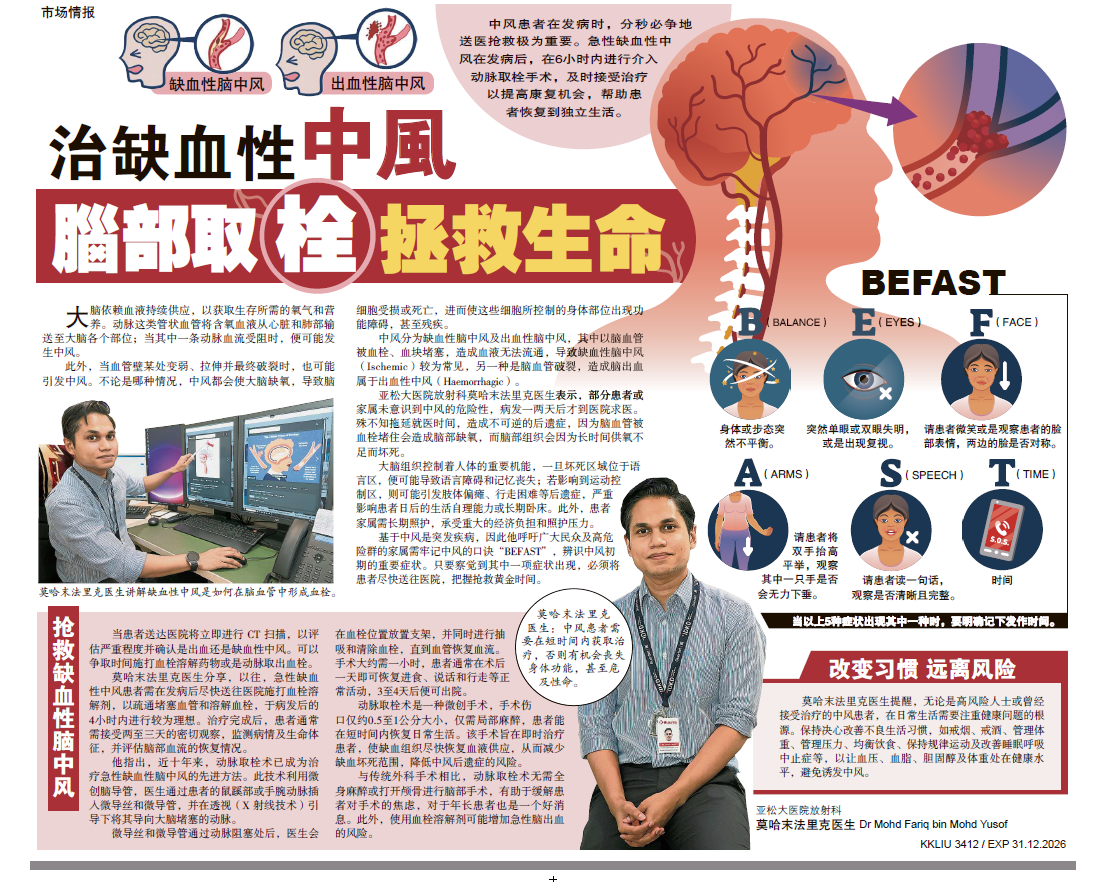Beware of Ear, Nose, and Throat Issues When Diving!
- Updated on: August 14, 2024
Diving activities are becoming increasingly popular, especially in Malaysia with its many beautiful islands and rich marine ecosystems. Many divers take the opportunity during their holidays to enjoy the pleasures of diving. If after diving, you experience symptoms such as nosebleeds, ear bleeding, dizziness, ear pain, and ear inflammation, you should pay attention and seek medical attention to identify the cause.
Dr. Bee Cho Yin, an Ear, Nose, and Throat (ENT) specialist at Assunta Hospital, points out that not every diver will experience physical discomfort after diving. However, when the body shows abnormal symptoms, up to 80% of the problems are related to ENT health.
She explains that there is pressure underwater, and when divers descend into the sea, their bodies experience pressure that is double that on land. For every 10 meters of depth, the pressure increases by 1 atmosphere, and the deeper the dive, the greater the environmental pressure, and the body needs to adapt to these pressure changes.
If divers do not properly equalize the pressure, the underwater pressure can cause compression injuries (barotrauma) to the ears, nose, and other intracranial cavities, which can indirectly affect their ability to continue diving safely. Divers usually go to remote islands or wilderness areas, and when problems occur, although there may be emergency assistance, they still need to seek medical attention afterward.
On the other hand, even if divers seek medical attention, if the doctor is not familiar with diving medicine, they may not be able to prescribe the appropriate treatment to solve the problem. Divers may also be advised to stop diving, and since they have invested in a lot of diving equipment and gear, this may force them to give up their beloved hobby.
Dr. Bee Cho Yin is also a PADI-certified advanced open water diver. She mentioned that about 22,000 to 25,000 people obtain diving licenses each year, but less than 50% continue diving activities. She believes this may be because they have encountered ENT health problems that were not fully resolved, and therefore they do not dare to continue diving.
ENT Problems and Diving Risks
Ear Health
Middle ear barotrauma is the most common medical problem related to diving. The eardrum separates the outer ear and middle ear, and when divers ascend or descend in the sea, if the air pressure in the outer ear canal and the middle ear cavity changes rapidly or cannot be balanced, it may cause discomfort, pain, and complications such as eardrum rupture. Divers who have experienced middle ear barotrauma need 3 to 6 months for the eardrum to heal naturally, and if the eardrum is ruptured, they need to undergo repair surgery to avoid hearing impairment.
As for inner ear barotrauma, it is relatively rare and can occur during rapid pressure changes, leading to damage to the cochlea and vestibular system, thereby causing dizziness and hearing loss. Medical professionals should emphasize the correct pressure equalization techniques and refer patients with pressure equalization difficulties to ENT specialists for proper evaluation and management.
Nasal Health
If divers have nasal congestion and sinusitis, it will hinder pressure equalization and prevent them from diving deeper. Therefore, medical professionals need to proactively evaluate and manage these conditions, considering their impact on nasal airflow and pressure regulation.
Before engaging in diving activities, it is recommended that divers seek a doctor for a pre-dive evaluation. Nasal congestion can be managed by using nasal decongestants, and for those with nasal sensitivity, proper nasal irrigation can minimize the risk of sinus barotrauma during diving.
Throat Health
The abdomen is also one of the hollow organs. Due to changes in pressure and breathing patterns, gastroesophageal reflux disease (GERD) symptoms may worsen during the diving process, leading to throat inflammation, voice changes, or aspiration risks, affecting the diver’s comfort and safety underwater. Healthcare professionals should be alert to divers’ GERD symptoms and provide customized management strategies to mitigate their impact on diving activities, such as lifestyle changes and medication interventions.
Before and after diving activities, divers are prone to dry throat and should drink an appropriate amount of water, and also avoid overeating.
Comprehensive Examination for a More Enjoyable Diving Experience
Dr. Bee Cho Yin reminds that divers who have undergone previous surgical treatment or have conditions such as heart disease or asthma need to undergo a health check, as diving is an extreme sport that requires good physical function to cope with.
On the other hand, medical professionals in handling ENT diseases need to carefully understand the unique challenges and considerations involved, and ENT specialists play a crucial role in evaluating, managing, and preventing ENT-related problems in divers. By combining ENT expertise with diving medicine principles, they can help divers mitigate risks while enjoying the diving experience.
To this end, Assunta Hospital has introduced two health check packages specifically for diving enthusiasts to ensure they can fully understand their health condition before engaging in extreme sports, and thus better enjoy the pleasures of diving.
Welcome to visit assunta.com.my for more details.
Caption 1: Dr. Bee Cho Yin advises that both professional divers and enthusiasts should undergo a health check to understand if their health condition is suitable for diving activities.
Caption 2: Dr. Bee Cho Yin encourages divers to undergo nasal endoscopy examination.
潛水出現頭暈耳痛等症狀
小心是耳鼻喉有事!
潜水活动越来越受欢迎,特别是马来西亚拥有众多美丽海岛和丰富的海洋生态,许多潜水者趁著假期前来享受潜水的乐趣。如果在潜水过后,出现流鼻血、耳朵流血、头晕、耳痛和耳朵发炎等身体不适的情况,应注意并赶紧就医找病因。
阿松大医院耳鼻喉头颈专科医生马楚雁指出,并非每位潜水员在潜水后都会出现身体不适。然而,当身体出现异常症状时,多达80%的问题与耳鼻喉健康有关。
她解释,海底水下有压力,当潜水员潜入海里时,身体承受的压力比在陆地上高一倍。每下潜10公尺,压力就会增加1大气压,而下潜得越深,环境压力越大,身体需要适应这种压力变化。
如果潜水员没有做好压力平衡,水下的压力会导致耳、鼻等颅内空腔受到挤压伤(Barotaruma),又叫气压伤,这将间接影响他能否继续安全潜水。通常潜水员都是去海岛或荒野的地方,当下发生问题发生时虽有紧急援助,过后仍需要去求诊。
另一方面,即使潜水员前往求诊,如果医生不熟悉潜水医学的相关知识,可能无法对症下药解决问题。潜水员还可能被建议停止潜水,而他们为了这一爱好购买了大量潜水装备和用品,这可能迫使他们放弃热爱的兴趣。
马楚雁医生也是一位PADI认证的高级水肺潜水员。她提到,每年约有2万2000至2万5000人考获潜水执照,但继续潜水活动的人数不到50%。她认为,这可能是因为他们遇到了耳鼻喉健康问题,未能彻底解决问题,因此不敢继续潜水。
耳鼻喉问题与潜水风险
耳朵健康
中耳气压伤是潜水相关的最常见医疗问题。耳膜分隔外耳和中耳,当潜水员在海里上升或下降过程中,外耳道的气压与中耳腔气压迅速变化或未能平衡时,可能导致不适、疼痛以及诸如耳膜破裂等并发症。潜水员经历了中耳气压伤,需要3至6个月时间等待耳膜自然修复,如果耳膜破裂需要进行修补手术,避免影响听力。
至于内耳气压伤比较罕见,可能发生在压力快速变化期间,导致耳蜗和前庭系统受损,从而引起眩晕和听力损失。医护人员应强调正确的平衡压力技巧,并将有平衡压力困难的患者转介给耳鼻喉科专科医生进行适当的评估和管理。
鼻部健康
潜水员若有鼻塞和鼻窦炎的情况,会妨碍平衡压力,也无法往深处下潜。因此,医护人员需应主动评估和管理这些情况,考虑它们对鼻流量和压力调节的影响。
在进行潜水活动前,建议潜水员寻求医生进行潜水前评估方案。鼻塞可以通过使用鼻减充血剂来管理,而鼻敏感者则可通过适当冲洗鼻窦,以最大限度地降低潜水期间发生鼻窦气压伤的风险。
喉咙健康
腹部也属于空腔脏器之一。由于压力和呼吸方式的改变,胃食管反流症状(GERD)可能会在潜水过程中恶化,导致喉咙发炎、声音改变或吸入风险,影响潜水员在水下的舒适度和安全性。医疗保健专业人员应警惕潜水员的胃食管反流症状,并提供量身定制的管理策略来减轻其对潜水活动的影响,例如改变生活方式和药物干预。
在潜水活动之前及之后,潜水员容易感到喉咙乾涩,应饮用适量的水,还有避免进食过饱。
全面检查更畅享潜水体验
马楚雁医生提醒,那些曾经接受过手术治疗或患有心脏病、哮喘等疾病的潜水员,更需要进行健康检查,毕竟潜水是一项极限运动,需要良好的身体机能来应对。
另一方面,医护人员在处理耳鼻喉疾病时,需要仔细了解其中的独特挑战和考虑因素,而鼻喉专科医生在评估、管理和预防潜水员的耳鼻喉相关问题方面发挥着至关重要的作用。通过将耳鼻喉专业知识与潜水医学原理相结合,帮助潜水员减轻风险,同时享受潜水的体验。
为此,阿松大医院特别为潜水爱好者推出了两项健康检查配套,以确保他们在进行极限运动之前能够充分了解自己的健康状况,从而更好地享受潜水的乐趣。
欢迎浏览查询更多详情:assunta.com.my
马楚雁医生Dr Bee Cho Yin
阿松大医院耳鼻喉头颈专科医生
圖說1:马楚雁医生建议,无论是专业潜水员或爱好者为自己进行健康检查,了解健康状况是否适合进行潜水活动。
圖說2:马楚雁医生鼓励潜水员进行鼻腔内视镜检查。

Related Articles











